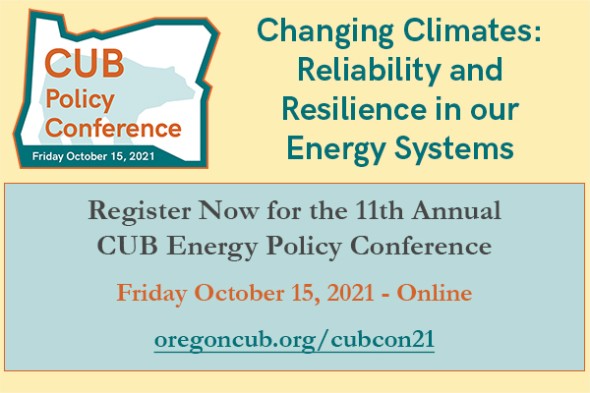2021 CUB Conference Panel Preview: Heating our Buildings in a Changing Climate
Posted on September 30, 2021 by Mike Goetz
Tags, Conference & Events

CUB’s 11th annual energy policy conference, Changing Climates: Reliability and Resilience in our Energy Systems, is only two weeks away. Taking place in a virtual format on Friday October 15, this conference will convene expert speakers and panelists to discuss emerging policy issues in the Pacific Northwest energy sector. We are offering a series on the CUB Blog of previews of each of the conference’s sessions. Today I’m pleased to introduce the breakout panel Heating our Buildings in a Changing Climate.
We are experiencing the early phases of a paradigm shift in the way we consume energy, driven by changes to both our environmental and policy climates. A diverse range of stakeholders agree that we must decarbonize the way we heat the built environment to comply with government mandates and maintain a livable climate. However, those same stakeholders are not so unified on the proper path to clean up the heating sector. Some new technologies and products such as renewable natural gas, efficient electric heat pumps, and renewable hydrogen offer promise. Yet there is no broad consensus on the proper blend of technology and policy to meet our energy demands in a least cost, least risk, and least carbon manner.
Equity issues are rightfully at the forefront of this discussion. We must decarbonize heating in a way that does not substantially increase consumer costs, especially for those already suffering heavy energy burdens. If we continue to invest in the natural gas system, and a subset of customers then leave the system to electrify their homes and businesses, those remaining on the natural gas system will be exposed to substantial stranded costs.
Conversely, under a scenario with less electrification, if technologies such as renewable natural gas and renewable hydrogen do not meet clean energy mandates, customers could face added costs without a corresponding benefit. In the coming years, all parties must be careful to ensure we are making the right investments in both the electric and natural gas systems to optimize our energy use and do the greatest good for all. How can we get to a decarbonized future with as little bill impact as possible?
Our expert panelists will cover these issues and more in what I expect will be a lively discussion. We are grateful for the participation of our esteemed panelists: Debra Gore-Mann - President and CEO of The Greenlining Institute; Mary Moerlins - Director of Environmental Policy & Corporate Responsibility at NW Natural; Taylor McNair - Program Manager for GridLab; and Sherrie Villmark - Program Director at the Community Energy Project.
I am also pleased to announce that this CUB Policy Conference has been accredited by the Oregon State Bar for 4 general MCLE credits for participating attorneys. Registration will be open until 5pm on Thursday, October 14. You can learn more about the program and register on our conference website: oregoncub.org/cubcon21.
We are grateful to the generous sponsors whose support makes this event possible, particularly Polar Bear sponsors NW Natural, Pacific Power, and Portland General Electric, as well as Media sponsor Clearing Up.
Visit the Conference & Events section of our blog for previews of the other three breakout sessions we have planned as well as our keynote speaker, Ezell Watson – Director of Diversity, Equity, and Inclusion at the Public Utility Commission. And stay tuned for a preview of our opening panel with NW utility executives and opening presentation by CUB Executive Director Bob Jenks – coming soon!
1095164




09/30/21 | 0 Comments | 2021 CUB Conference Panel Preview: Heating our Buildings in a Changing Climate